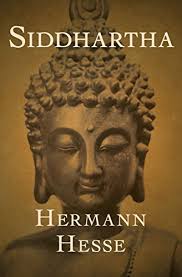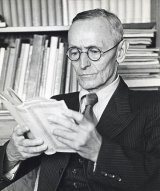Siddhartha Page #22
Siddhartha is a novel by Hermann Hesse that deals with the spiritual journey of self-discovery of a man named Siddhartha during the time of the Gautama Buddha. The book, Hesse's ninth novel, was written in German, in a simple, lyrical style.
But in the end of Siddhartha's tale, when he spoke of the tree by the river, and of his deep fall, of the holy Om, and how he had felt such a love for the river after his slumber, the ferryman listened with twice the attention, entirely and completely absorbed by it, with his eyes closed. But when Siddhartha fell silent, and a long silence had occurred, then Vasudeva said: "It is as I thought. The river has spoken to you. It is your friend as well, it speaks to you as well. That is good, that is very good. Stay with me, Siddhartha, my friend. I used to have a wife, her bed was next to mine, but she has died a long time ago, for a long time, I have lived alone. Now, you shall live with me, there is space and food for both." "I thank you," said Siddhartha, "I thank you and accept. And I also thank you for this, Vasudeva, for listening to me so well! These people are rare who know how to listen. And I did not meet a single one who knew it as well as you did. I will also learn in this respect from you." "You will learn it," spoke Vasudeva, "but not from me. The river has taught me to listen, from it you will learn it as well. It knows everything, the river, everything can be learned from it. See, you've already learned this from the water too, that it is good to strive downwards, to sink, to seek depth. The rich and elegant Siddhartha is becoming an oarsman's servant, the learned Brahman Siddhartha becomes a ferryman: this has also been told to you by the river. You'll learn that other thing from it as well." Quoth Siddhartha after a long pause: "What other thing, Vasudeva?" Vasudeva rose. "It is late," he said, "let's go to sleep. I can't tell you that other thing, oh friend. You'll learn it, or perhaps you know it already. See, I'm no learned man, I have no special skill in speaking, I also have no special skill in thinking. All I'm able to do is to listen and to be godly, I have learned nothing else. If I was able to say and teach it, I might be a wise man, but like this I am only a ferryman, and it is my task to ferry people across the river. I have transported many, thousands; and to all of them, my river has been nothing but an obstacle on their travels. They travelled to seek money and business, and for weddings, and on pilgrimages, and the river was obstructing their path, and the ferryman's job was to get them quickly across that obstacle. But for some among thousands, a few, four or five, the river has stopped being an obstacle, they have heard its voice, they have listened to it, and the river has become sacred to them, as it has become sacred to me. Let's rest now, Siddhartha." Siddhartha stayed with the ferryman and learned to operate the boat, and when there was nothing to do at the ferry, he worked with Vasudeva in the rice-field, gathered wood, plucked the fruit off the banana-trees. He learned to build an oar, and learned to mend the boat, and to weave baskets, and was joyful because of everything he learned, and the days and months passed quickly. But more than Vasudeva could teach him, he was taught by the river. Incessantly, he learned from it. Most of all, he learned from it to listen, to pay close attention with a quiet heart, with a waiting, opened soul, without passion, without a wish, without judgement, without an opinion. In a friendly manner, he lived side by side with Vasudeva, and occasionally they exchanged some words, few and at length thought about words. Vasudeva was no friend of words; rarely, Siddhartha succeeded in persuading him to speak. "Did you," so he asked him at one time, "did you too learn that secret from the river: that there is no time?" Vasudeva's face was filled with a bright smile. "Yes, Siddhartha," he spoke. "It is this what you mean, isn't it: that the river is everywhere at once, at the source and at the mouth, at the waterfall, at the ferry, at the rapids, in the sea, in the mountains, everywhere at once, and that there is only the present time for it, not the shadow of the past, not the shadow of the future?" "This it is," said Siddhartha. "And when I had learned it, I looked at my life, and it was also a river, and the boy Siddhartha was only separated from the man Siddhartha and from the old man Siddhartha by a shadow, not by something real. Also, Siddhartha's previous births were no past, and his death and his return to Brahma was no future. Nothing was, nothing will be; everything is, everything has existence and is present." Siddhartha spoke with ecstasy; deeply, this enlightenment had delighted him. Oh, was not all suffering time, were not all forms of tormenting oneself and being afraid time, was not everything hard, everything hostile in the world gone and overcome as soon as one had overcome time, as soon as time would have been put out of existence by one's thoughts? In ecstatic delight, he had spoken, but Vasudeva smiled at him brightly and nodded in confirmation; silently he nodded, brushed his hand over Siddhartha's shoulder, turned back to his work. And once again, when the river had just increased its flow in the rainy season and made a powerful noise, then said Siddhartha: "Isn't it so, oh friend, the river has many voices, very many voices? Hasn't it the voice of a king, and of a warrior, and of a bull, and of a bird of the night, and of a woman giving birth, and of a sighing man, and a thousand other voices more?" "So it is," Vasudeva nodded, "all voices of the creatures are in its voice." "And do you know," Siddhartha continued, "what word it speaks, when you succeed in hearing all of its ten thousand voices at once?" Happily, Vasudeva's face was smiling, he bent over to Siddhartha and spoke the holy Om into his ear. And this had been the very thing which Siddhartha had also been hearing. And time after time, his smile became more similar to the ferryman's, became almost just as bright, almost just as throughly glowing with bliss, just as shining out of thousand small wrinkles, just as alike to a child's, just as alike to an old man's. Many travellers, seeing the two ferrymen, thought they were brothers. Often, they sat in the evening together by the bank on the log, said nothing and both listened to the water, which was no water to them, but the voice of life, the voice of what exists, of what is eternally taking shape. And it happened from time to time that both, when listening to the river, thought of the same things, of a conversation from the day before yesterday, of one of their travellers, the face and fate of whom had occupied their thoughts, of death, of their childhood, and that they both in the same moment, when the river had been saying something good to them, looked at each other, both thinking precisely the same thing, both delighted about the same answer to the same question.
Translation
Translate and read this book in other languages:
Select another language:
- - Select -
- 简体中文 (Chinese - Simplified)
- 繁體中文 (Chinese - Traditional)
- Español (Spanish)
- Esperanto (Esperanto)
- 日本語 (Japanese)
- Português (Portuguese)
- Deutsch (German)
- العربية (Arabic)
- Français (French)
- Русский (Russian)
- ಕನ್ನಡ (Kannada)
- 한국어 (Korean)
- עברית (Hebrew)
- Gaeilge (Irish)
- Українська (Ukrainian)
- اردو (Urdu)
- Magyar (Hungarian)
- मानक हिन्दी (Hindi)
- Indonesia (Indonesian)
- Italiano (Italian)
- தமிழ் (Tamil)
- Türkçe (Turkish)
- తెలుగు (Telugu)
- ภาษาไทย (Thai)
- Tiếng Việt (Vietnamese)
- Čeština (Czech)
- Polski (Polish)
- Bahasa Indonesia (Indonesian)
- Românește (Romanian)
- Nederlands (Dutch)
- Ελληνικά (Greek)
- Latinum (Latin)
- Svenska (Swedish)
- Dansk (Danish)
- Suomi (Finnish)
- فارسی (Persian)
- ייִדיש (Yiddish)
- հայերեն (Armenian)
- Norsk (Norwegian)
- English (English)
Citation
Use the citation below to add this book to your bibliography:
Style:MLAChicagoAPA
"Siddhartha Books." Literature.com. STANDS4 LLC, 2024. Web. 24 Nov. 2024. <https://www.literature.com/book/siddhartha_24>.




Discuss this Siddhartha book with the community:
Report Comment
We're doing our best to make sure our content is useful, accurate and safe.
If by any chance you spot an inappropriate comment while navigating through our website please use this form to let us know, and we'll take care of it shortly.
Attachment
You need to be logged in to favorite.
Log In